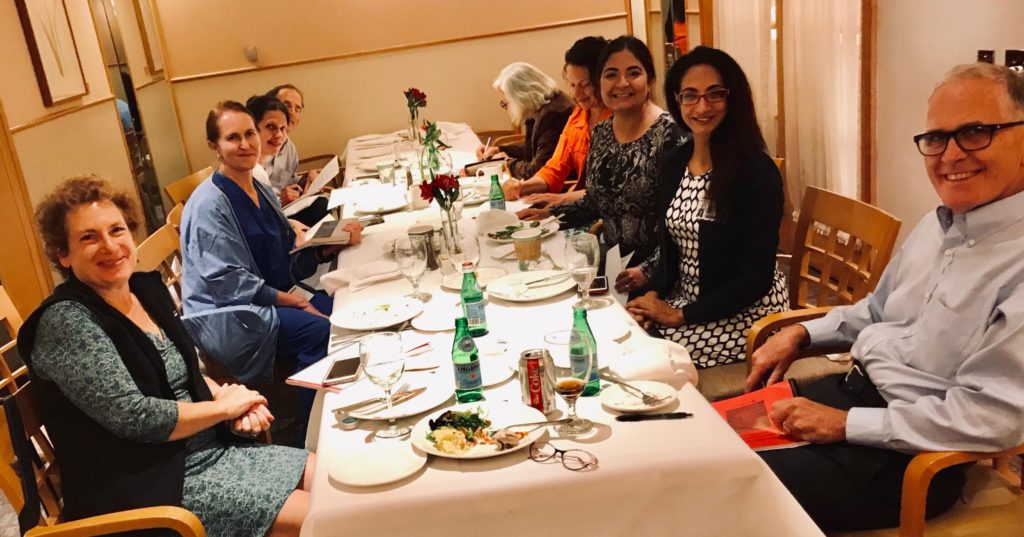In recognizing the 10,000th-post milestone for SCOPE, I'm happy to celebrate another milestone: the five-year anniversary of the Literature and Medicine Dinner and Discussion (LitMed) series, which I am thrilled to facilitate.
Once a month, for six months, physicians come together to discuss essays, poems and short stories while sharing dinner. The readings, by writers including Virginia Wolff, Oliver Sacks, Mary Oliver and Anton Chekov, are chosen to prompt discussion and reflection on the challenges and rewards of being a doctor.
The series, co-created with Benny Gavi, MD, has reached some 100 Stanford physicians with what I call the "slow medicine" of literature. At a time when physician burnout is reaching crisis levels, the monthly event combats some of the contributing factors, like loneliness due to increased technological demands and lack of connection to colleagues. The LitMed program is decidedly low tech. Readings are printed on paper, and we are together in one of the few activities left that an app cannot perform or enhance -- sharing a meal.

Laughter, described by Victor Hugo as "the sun that drives winter from the human face," is one of the few requirements of LitMed, along with the "three Cs": compassion, collegiality and confidentiality. These guidelines help create a safe space for physicians to talk about their own challenging experiences, fears and joys.
My journey to a degree in medical humanities and the creation of this series began almost two decades ago, as I sat vigil in the hospital with my sister Natalie, who at 52 was dying from lung cancer that had spread to her brain.
When I got on the elevator late one night, I saw our family oncologist, Dr. Hagerty. The typically neatly dressed doctor appeared disheveled, his eyes bleary, his shoulders slumped in defeat. He held an attaché case overflowing with medical journals and papers.
He had already seen my sister Maria and mom lose their cancer battles, and now, despite all efforts, Natalie would die too. In that moment on the elevator, Dr. Hagerty looked so crushed and sad that it finally occurred to me how tough it must be for him and for all doctors who get up every day to push back the tide of disease and death.
I had not heard of medical humanities until I was recruited for a job at the University of Texas Medical Branch, home to one of the first programs in the field. As soon as I read that the field looks at the history and practice of medicine through the lens of the humanities and arts, I had an aha moment, based on my personal experience, that this was a course of study that could led to meaningful work with doctors.
While the language of medicine is often one of classification, the language of literature encompasses the entire human experience that physicians are often an integral part of: the good, the bad, the tragic, the profound. Literature can help physicians and patients find language when medicine has done all it can.
I found my own despair at the too young death of my sister eloquently expressed in W.H. Auden's poem, "Funeral Blues," especially when the speaker urges, "Pack up the moon and dismantle the sun." At the same time, poet Mary Oliver's urgent question in "The Summer Day" jolts me into action and appreciation for life, loved ones and for this work I so enjoy: "Tell me, what is it you plan to do with your one wild and precious life?"
On this fifth anniversary of LitMed, I would like to extend a thank you to all of the physicians and health care professionals who have chosen to devote their precious lives to the healthy living and dignified dying of their fellow human beings. I believe it is true, what Hippocrates said:
"Wherever the art of medicine is loved, there is also a love of humanity."
Jacqueline Genovese is co-facilitator of the Literature and Medicine Dinner and Discussion series, which is sponsored by Stanford's Medicine and the Muse Program and WellMD & WellPhD. She holds masters degrees in medical humanities and creative non-fiction and serves as the executive director of Medicine and the Muse.
This piece is part of Scope@10,000, a series of original narrative essays from writers, physicians and thinkers in honor of Stanford Medicine's Scope blog publishing 10,000 posts.
Top photo by Syd Wachs






